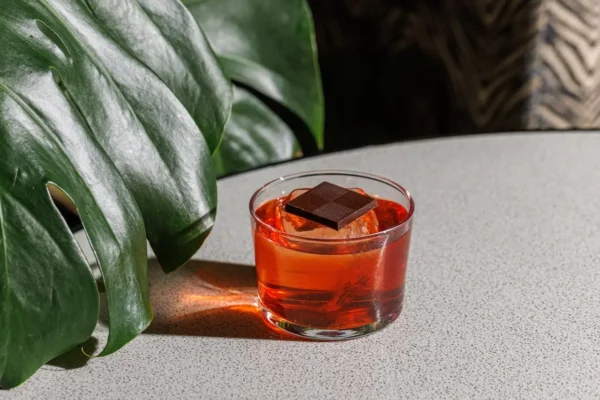Vermouth is one of those drinks everyone has heard of at least once—perhaps without really knowing what it is. It appears in famous cocktails, is sipped neat in old-school bars, and has that elegant charm that never goes out of style. But what exactly is vermouth? Is it a wine, a spirit, a bitter? And more importantly: how do you use it in cocktails?
In this article, we explore everything there is to know about this iconic aromatized drink—from its composition to its variations, from the best times to enjoy it to the cocktails where it truly shines. Ready to dive into the world of vermouth?
What Kind of Spirit Is Vermouth?
Strictly speaking, vermouth is not a liquor—it’s an aromatized wine. It starts with a base of white or red wine, to which neutral alcohol and a blend of herbs, spices, roots, and flowers are added. These ingredients macerate together for weeks or even months, creating a complex beverage that can be sweet, dry, bitter, or spicy.
The alcohol content of vermouth generally ranges between 15% and 18%. Depending on the recipe, it may include wormwood, gentian, citrus peels, cinnamon, cloves, nutmeg, vanilla, and many other botanicals.
What Wine Is Used to Make Vermouth?
Vermouth is almost always based on dry white wine, even in versions that appear red. Neutral, light wines like Trebbiano or Catarratto are commonly used so the spices and botanicals can take center stage.
However, some artisanal or more structured vermouths may start from slightly sweeter or oxidized wines. Still, the wine plays a supporting role—it’s not the star.
What’s the Difference Between White and Red Vermouth?
White vermouth is usually sweeter and more floral. It has a delicate flavor, often with vanilla, citrus, or herbal notes. It’s perfect served neat, over ice, or in light, fragrant cocktails.
Red vermouth, on the other hand, is more intense—think caramel, spices, licorice, and bitter tones. Despite its color, it is often made from white wine but colored with caramelized sugar or natural ingredients.
When Do You Drink Vermouth?
Vermouth can be enjoyed at various times of the day, but traditionally it’s an aperitif drink. In Italy, it had a true “golden age” between the 19th and early 20th centuries, served neat with an orange slice and a few olives.
Today, it’s making a comeback as a digestif or cocktail ingredient, but the ideal moment remains the aperitivo hour—preferably with salty finger foods or classic bar snacks like chips, olives, or cured meats.
Vermouth in Cocktails: How to Use It
Vermouth is a cornerstone of international mixology. It’s not just an ingredient—it often brings the roundness, complexity, and balance to world-renowned drinks.
Here are some cocktails where vermouth plays a starring role:
- Negroni: gin, red vermouth, and bitter. Iconic and bold.
- Americano: red vermouth, bitter, and soda. Refreshing and easy-drinking.
- Dry Martini: gin and dry vermouth, garnished with an olive or lemon twist.
- Manhattan: whiskey, red vermouth, and Angostura bitters. Classic and refined.
- Boulevardier: bourbon, red vermouth, and bitter. A smoother take on the Negroni.
The golden rule for vermouth in cocktails? Don’t let it oxidize. Once opened, store it in the fridge and use it within 1–2 months.
What’s the Difference Between Marsala and Vermouth?
Both are fortified wines, but Marsala and vermouth are very different. Marsala is a Sicilian dessert wine made from native grapes and fortified with alcohol or cooked must. It has a rich, warm, sweet flavor and is often used in cooking (especially in savory dishes like chicken Marsala) or sipped as a dessert wine.
Vermouth, on the other hand, is flavored with herbs and spices, with a drier, more balsamic or bitter profile. While Marsala rarely appears in cocktails, vermouth is a mixology staple.
What’s the Difference Between Vermouth and Martini?
This can be confusing. Martini is both a type of cocktail (the Dry Martini) and a historic Italian brand of vermouth, one of the most famous worldwide. So it depends on what you mean.
- If you’re talking about the Martini cocktail, it’s a mix of gin and dry vermouth.
- If you’re talking about Martini the brand, it was founded in Turin in 1863 and produces several kinds of vermouth: white, red, rosé, extra dry, special reserve, and more.
In short: all Martini is vermouth, but not all vermouth is Martini.
Is Campari a Vermouth?
No, Campari is not a vermouth. It’s a bitter, a type of spirit made from infusions of herbs, spices, and citrus peels. Bright red and intensely flavored, Campari is famous for its bitter notes of gentian and bitter orange.
Still, vermouth and Campari often meet in cocktails—think Negroni or Americano. In those cases, Campari brings the bitterness, while vermouth adds smoothness and aromatic depth.
What’s the Best Vermouth?
There’s no single “best” vermouth—it depends on your preferences and how you plan to use it. That said, there are premium and artisanal vermouths highly regarded by bartenders:
- Vermouth di Torino (PGI), such as Carpano Antica Formula, Cocchi, or Mancino
- Dry French vermouths like Noilly Prat or Dolin
- Modern vermouths with refined botanicals, often in small batches
If you’re just starting out, begin with a classic Italian vermouth and gradually explore artisanal options.
What’s the Best Vermouth for an Americano?
For a perfect Americano, go for a smooth, spicy red vermouth that balances the bitter and the soda’s freshness.
Top picks include:
- Carpano Antica Formula: rich, vanilla-forward, intense.
- Cocchi Vermouth di Torino: spicier and drier—great if you prefer balance.
- Martini Riserva Speciale Rubino: elegant and well-structured.
Just make sure it’s fresh, properly stored, and of good quality. A great drink can be ruined by a bad vermouth.
What Pairs Well with Vermouth?
Vermouth is also incredibly food-friendly. Neat, it pairs beautifully with savory snacks such as:
- Green or black olives
- Artisan potato chips
- Taralli crackers
- Cured meats and cheeses
- Marinated anchovies or anchovies in oil
In cocktails, vermouth works well with:
- Gin and bitters (for bold, complex drinks)
- Bourbon or rye whiskey (for rich, warming cocktails)
- Soda or tonic water (for a light aperitif)
What Can I Use Instead of Vermouth?
Run out of vermouth just as you’re making a cocktail? No problem—here are some substitutes, though they’ll slightly change the final flavor.
For dry vermouth, try:
- Dry sherry (like Fino or Manzanilla)
- Dry white wine with a dash of Angostura
- Lillet Blanc (a bit sweeter, but similar)
For red vermouth, consider:
- Tawny Port
- Dry Marsala
- Light amari or sweet bitters, in small amounts
- Spiced red wine—even homemade
Each swap will shift the cocktail’s profile, but it’s a great chance to try a creative twist.
Where to Drink Creative Vermouth Cocktails in Naples
Want to taste the real thing? Try it in person at KarmaCore, a cocktail bar in the heart of Naples, where our bartenders highlight vermouth in creative drinks with surprising pairings. Or book a table and let yourself be guided through artisanal vermouths, iconic cocktails, and bold new takes.


